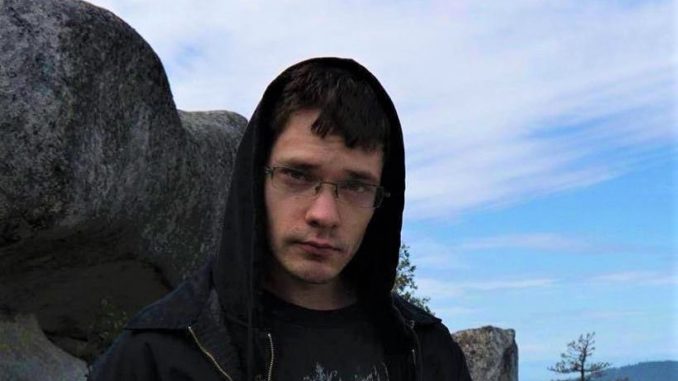
Nearly three months to the day after Stephen Vest was shot dead outside of the Chico Petco store, Butte County District Attorney Mike Ramsey announced his decision that two Chico Police Department (CPD) officers were justified in killing the 30-year-old man. Local police watchdogs, however, have a different take on the tragic incident, and Ramsey’s ruling has spurred reiterated calls to reform CPD polices, how police interact with people in crisis and how fatal shootings are investigated.
Ramsey absolved CPD Sgt. Nicholas Bauer and Officer Tyler Johnson of wrongdoing in the Oct. 15 shooting and shared the results of a Butte County Officer Involved Shooting/Critical Incident Protocol Team at a Jan. 14 press conference. Officer William Page was also present the night of Vest’s death but did not fire his gun. Though these announcements are nothing new to Ramsey—who has overseen such investigations for dozens of police shootings in his 34 years as district attorney—the latest was adapted for COVID-19 and to allow greater public participation. It was broadcast live to Facebook and YouTube, and Ramsey fielded questions from journalists present at the D.A.’s office and from online viewers.
Vest had been experiencing homelessness since his grandfather’s home burned in the Camp Fire. Friends say he was a kind and peaceful—but troubled—soul who’d experienced a great deal of trauma throughout his life, and who many suspected of suffering from mental illness. Toxicology reports from the night of his death show a high level of methamphetamine in his blood.
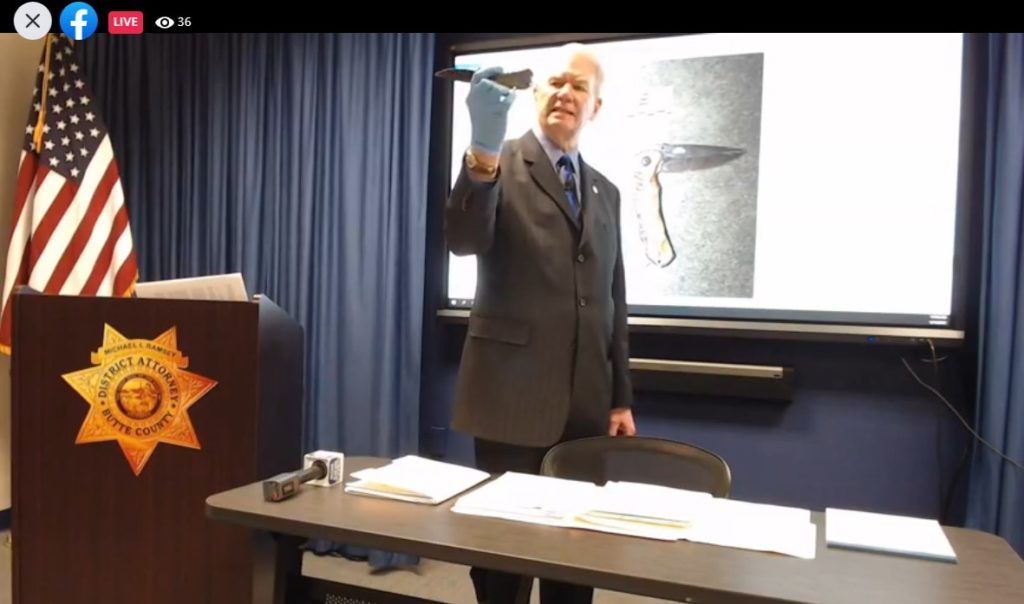
“It was clear the officers that night had an objectively reasonable belief that they and the citizens that are sworn to protect were in imminent danger of death or great bodily harm,” Ramsey said during the conference. “As such, under those facts and the law, I find the shooting to be justified, and there will be no further activity going forth.”
Replaying the events
Ramsey’s narrative focused on the night of Vest’s death. According to the D.A., the lead-up to the shooting began with a 911 call at 7:29 p.m., in which a man reported that a bloody “guy with a knife, high on something” chased his 15-year-old daughter at Community Park on Dr. Martin Luther King Jr. Parkway.
At 7:47, a security guard with Armed Guard Private Security spotted the man—later identified as Vest—in the parking lot of the park’s field house/gymnasium. Vest reportedly tried to use a knife to stab the security guard through an open window of the vehicle, then jumped on the hood of the car and tried to break the windshield. The guard accelerated to throw Vest from the hood and followed him toward the intersection of MLK and 20th Street. At one point, the men engaged again and the guard shot Vest with his Taser, which connected but did not have the desired effect of immobilizing Vest.
Vest next moved into the aforementioned intersection, where he reportedly slashed his knife at cars, left bloody hand prints on vehicles and tried to mount a motorcycle behind its rider. Several motorists called 911 as Vest then moved toward the Petco parking lot, where he approached a store employee helping a truck driver unload a shipment. CPD officers Bauer and Page arrived at approximately 7:56 p.m. and observed Vest chasing the workers inside the store through the loading dock. Bauer reportedly first reached for a non-lethal, bean-bag shotgun, but found only a lethal version. According to Ramsey’s report, this is because Bauer’s regular vehicle was being maintained and he’d borrowed another sergeant’s SUV.
Bauer also didn’t turn on his body camera. Ramsey said this was because he forgot to activate the device in the heat of the moment.
The officers left their vehicles and chased Vest across the loading bay and into a hallway, determining then that Bauer would act as lethal force while Page would try to subdue the man with a non-lethal Taser. Rather than continuing pursuit further into the building, the officers exited and moved to the outside front of the store, intending to evacuate the employees inside.
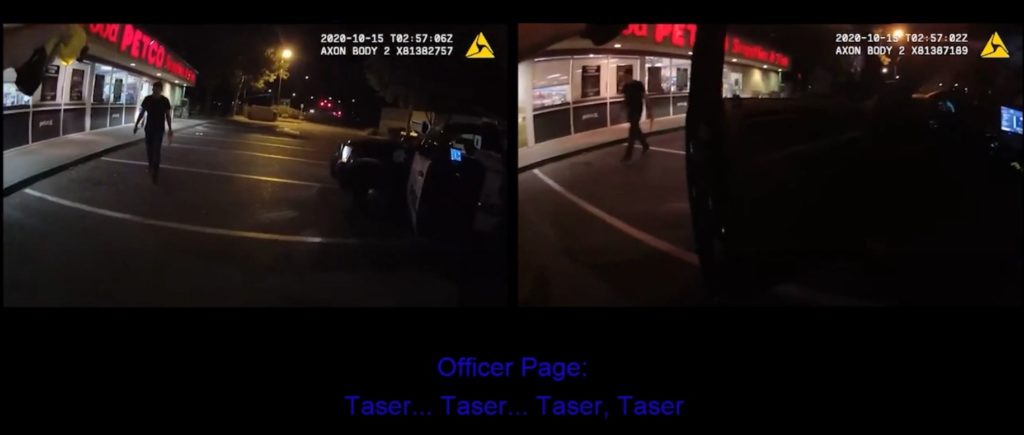
Officer Johnson arrived at the front of the store at the same time as Bauer and Page—and as Vest pursued the two workers out of the store’s front door. The employees ran toward and past the officers, and Vest followed, walking rapidly as the officers yelled at him to drop the knife and get on the ground. Page fired his Taser, which connected but, again, failed to stop Vest. Bauer and Johnson then opened fire with their semiautomatic pistols, squeezing off a total of 11 shots (two from Bauer’s .45 and nine from Johnson’s 9mm) in 2.03 seconds. Vest was hit at least eight times. Officers kicked away the knife, cuffed Vest and began CPR, to no avail. Vest’s pulse faded quickly, and he was pronounced dead at the scene.
The time elapsed between Bauer and Page arriving at the scene and the shooting was only 50 seconds.
A better way?
Margaret Swick and George Gold are founding members of Concerned Citizens for Justice (CC4J), an organization formed in the wake of the 2017 CPD killings of Desmond Phillips and Tyler Rushing. The group’s goals include: pushing for local law enforcement to prioritize deescalation and Crisis Intervention Training over use of force; policy and procedure reform; community oversight of the CPD; and greater transparency and communication between the department and the citizens it’s sworn to protect. Interviewed via Zoom Jan. 19, the two said that Vest’s killing and the subsequent investigation are representative of many of the problems with local law enforcement they strive to address.
“We believe there were reasonable alternatives to deadly force in this instance,” Swick said. “Officers approached Vest in a combative, ‘command and control’ manner. They did not approach as problem solvers who hoped to control a young man who was homeless, destitute and drugged. Their only response was with the Taser and the gun.”
“This kind of behavior by a police department is abhorrent, and it’s outdated,” Gold said. “This is 2021 and they can’t come up with a better routine than shooting a guy with a small knife, whose only violations at that time were vandalizing benches in a park and a smashed windshield on a car. By the time they shot him, he hadn’t hurt anyone except himself.”
Gold noted that roughly eight seconds elapsed between the time officers verbally engaged Vest in front of the store and when they opened fire.
“It’s abundantly clear that Chico police officers have absolutely no skills in deescalation techniques or how to apply those processes in the field,” he said. He suggested that proper training could have led to a better outcome and suggested that police could have otherwise subdued Vest.
Gold mentioned that Eugene, Ore., runs a successful, 30-year-old program called CAHOOTS that dispatches social workers trained in deescalation—rather than law enforcement personnel—to crises involving mental illness, homelessness and addiction. Butte County has a Mobile Crisis Team that partners mental health workers with law enforcement, but only operates during traditional business hours. Gold also referenced Crisis Care Advocacy and Triage, an independent local organization run by mental health advocate Lisa Currier whose staff is trained in crisis intervention and deescalation.
Interviewed separately on Jan. 25, Currier said she also thinks Vest’s death was avoidable. She noted that roughly half an hour passed between the time Vest was seen acting erratically in the park and when he was shot, which could have given someone with proper training time to calm him down. She emphasized the importance of having people in the community who know the homeless population and their baseline behaviors, and said people should have an established non-law enforcement option to call when they see others in crisis.
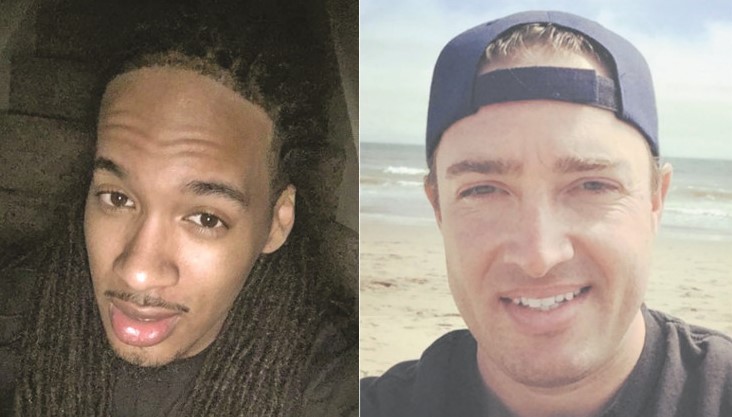
“If someone who’d known Stephen could have responded and he heard a familiar voice, that could have made all the difference,” she said. Currier noted that both the security guard and officers first interacted with Vest by “screaming at him,” which only serves to escalate such situations.
Ramsey’s report listed nearly two dozen incidents between December 2019 and the time of his death that Vest interacted with Chico and Oroville police, jail staff and his probation officer. In several of these contacts, Vest was violent or spoke of wanting to commit suicide. In March 2020, he was charged with a felony after biting an officer’s leg at Butte County Jail. While facing those charges, his attorney questioned his mental competency, but a psychologist said he was fit for trial, attributing his behavior to short-term methamphetamine psychosis.
Currier said this abundance of contacts amounted to cries for help, and ultimately she sees Vest as a victim of a system that failed to connect him with services to address his addiction and possible mental health issues.
During the press conference, Ramsey directly addressed some questions from the in-person and virtual audience about many of these criticisms. He said that the fast-moving, dangerous situation did not allow for deescalation, which he said the officers were trained in, or for other forms of engagement.
“I think it’s pretty clear from any reasonable view of the tape there was no time for that,” Ramsey said. “Also, [officers are] not grappling and tackling people with a knife.”
Ramsey referred to Vest’s mental state as a “chicken-egg” situation, emphasizing Vest’s drug use over possible undiagnosed mental illness, and said officers had no chance to evaluate his mental state “at the point of a knife.”
“[There is] no indication that Mr. Vest was begging for mental health help, other than when he was on methamphetamine and was at those times violent or suicidal,” Rasmey said. “A psychologist looked at this and the history of the probation department indicated no such history. Talking to family members they always indicated that Mr. Vest was a little odd, but a lot of that came from what they thought was his methamphetamine use.”
More systemic issues
Local police reform advocates have long criticized the method by which critical incidents are investigated in Butte County. The current process involves representatives from all Butte County law enforcement agencies forming for each investigation a Butte County Officer Involved Shooting/Critical Incident Protocol Team, which is overseen by Ramsey. As the District Attorney, he is the de facto “top lawman” in the county, and the team is made up solely of law enforcement officers. Critics question if it can be truly impartial.
CC4J’s research indicates Sgt. Bauer himself served on at least two of these teams, and in December the organization put out a press release asking that the state’s Attorney General oversee an independent investigation of Vest’s shooting. They also sent a letter to the AG’s office, which Swick said has yet to receive a response.
Furthermore, CC4J is critical of the overall transparency of the CPD, with Swick characterizing the department as “insular and opaque.” That estimation carries extra weight from Swick, who recently served on former Mayor Ann Schwab’s Policing Ad Hoc Committee. That committee was supposed to offer a critical examination of CPD’s policy and procedures, but was panned by a few of its participants and citizens who say it accomplished little. Swick said she hoped the committee would take a hard look at CPD policies and procedures and that its formation was a step toward the type of citizen oversight for which her group advocates.
“But that didn’t happen,” Swick said. “There was zero examination of our use of force policy. It was instead merely briefings by the police department, and it became a megaphone for them. The public never had a chance to hear comments from the public, and panelists never got to discuss items together.”
Swick and Gold said members of the public are not allowed to view complaints against officers or the cost of settlements CPD has paid out for excessive uses of force, and have trouble obtaining the simplest police records, even via submitting requests for public records that the police department is by law supposed to provide.
Gold submitted a public records request for info about the Vest shooting in November, to which he received a response from the city in December saying the records were unavailable because they are part of the ongoing criminal investigation into Vest’s death. He recently received another denial letter from the city on Jan. 15—the day after Ramsey’s press conference—saying that though Ramsey had concluded his investigation, the CPD was still conducting an administrative investigation.
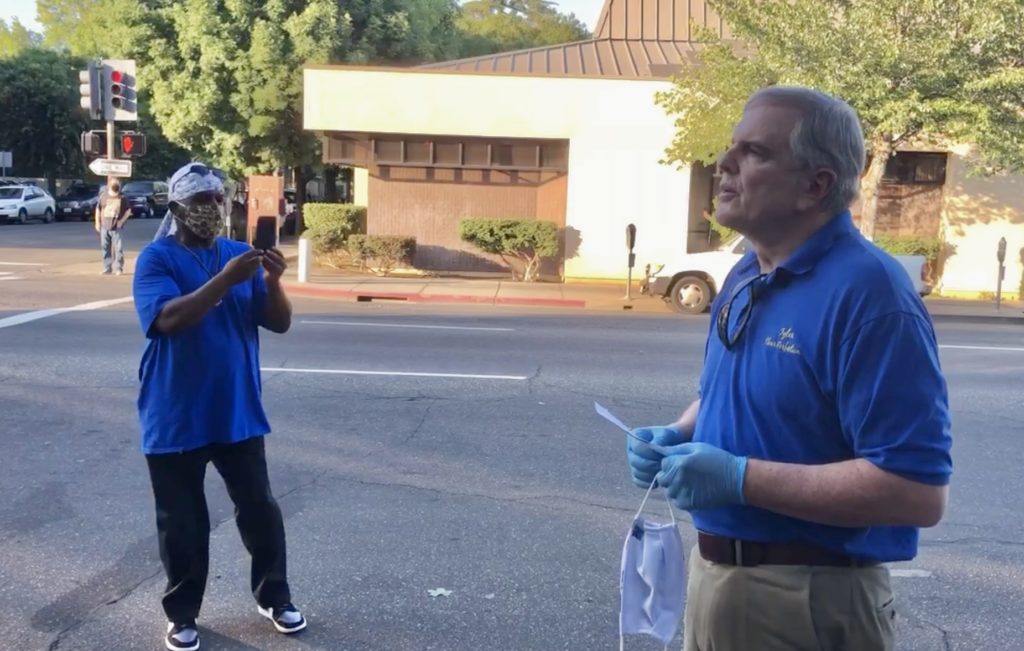
This doesn’t line up with CPD Chief Matt Madden’s statement, also made at the Jan. 14 press conference: “We have concluded that investigation, and we have found that our police officers acted within policy as it relates to use of force, and to our training standards. It was clear in our investigation that the officers were placed in a situation where lower levels of force, such as verbal commands and the use of a Taser, were used and were ineffective.”
Family members seek change
Ramsey’s declaration that the shooting was justified prompted statements from Justice for Desmond Phillips, which advocates for reform and for charges to be brought against the officers involved in the March 2017 killing of Phillips, and Scott Rushing, the father of Tyler Rushing, who was killed by CPD officers and an Armed Guard security employee in July 2017.
“Witnesses said it looked like an execution,” Justice for Desmond Phillips posted to its Facebook page on Jan. 14. “If this ‘news’ is surprising to you then you have not been paying attention. D.A. Ramsey has always justified every police murder in our county. … It has been almost 4 years since Desmond was murdered and nothing has significantly changed. Stephen Vest deserved help and support. So did Desmond. So do so many people who have been killed by law enforcement in our county.”
“The images of the quick killing of Stephen Vest by Sgt. Bauer and Officer Johnson have been in my dreams,” Rushing said via email Jan. 25. “In my opinion, the killing was a criminal act. Charges of unnecessary use of lethal force should be filed by the D.A. Stephen Vest should be alive today.”
Rushing said Bauer forgetting to turn on his body-worn camera defies CPD policy and leaving his less-lethal shotgun in another vehicle was “inexcusable,” saying he should be fired for incompetence.
“I believe that the [California] Attorney General’s office should have handled the investigation,” Rushing continued. “Ramsey should have done the right thing by requesting the A.G.’s involvement due to the potential conflict of interest of having the Butte County Officer-Involved/Shooting Critical Incident Protocol Team investigate a fellow member’s action. The record is clear. Police should never be policing themselves, and this is an example.”

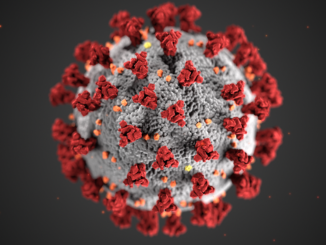

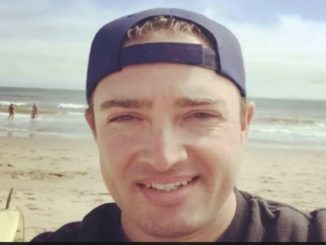
As long as police officers are incapable of recognizing the sanctity of human life and seeing a person who needs help, their solution to kill ,just because they do not want to take the time or effort , their solution to a cry for help is to kill them, by killing them their problem is solved,they don’t have to be merciful or be bothered with a moral compass, they are allowed to be and act heartless and egregious, this is just how I feel and have surmised by watching how cops react to people in a mental crisis and a cry for help.
I am still in shock. Stephen was a good friend of mine, he was there during the fire with me. He stayed back to try to save my place and our neighbors..
He had been staying with me for over 2 years before the cire and he was doing so much better. He agreed to see my psychiatrist and counselor. But the fire happened and it was too late. I wish I could have talked to him, talked him down. I still cry…
It is a matter of when, not if, the Chico PD will kill again. The officers have an overarching responsibiloity for the preservation of life but the violent, quick, unconscionable killing of Stephen Vest is another demonstration of the complete failure of Chico PD, the DA, and law enforcement in Butte County to protect and serve the public. Any reasonable person, considering the totality of the circumstances, would agree that the killing of Stephen was an unneccassary use of deadly force. After careful review of the Ramsey Report, it appears to be tainted because Sergeant Bauer’s colleagues investigated this killing; with obvious potential for a biased result. Shame on DA Ramsey and the law enforcment community that ignored what is clearly a criminal act.
Well said, thank you so much.